‘Reservation Dogs’: How Sterlin Harjo, Taika Waititi And The Cast Created A Fresh Take On Native American Life
- Oops!Something went wrong.Please try again later.
- Oops!Something went wrong.Please try again later.
- Oops!Something went wrong.Please try again later.

In one of the final moments of Reservation Dogs’ first season on FX, a spirit guide appears at the bedroom window of Bear Smallhill (D’Pharaoh Woon-A-Tai) to share a story about the young man’s ancestors. But the f-bomb-dropping, meat pie-eating guide with two feathers jutting from his head doesn’t wax on about the fierce warriors in Bear’s past; he’s there to reveal how the youth’s “great grandma Susie liked to smash white guys like hot cakes.”
“I don’t have the answers, only questions,” admits William ‘Spirit’ Knifeman (Dallas Goldtooth), before realizing he’s overstayed his welcome at Bear’s bedside.
More from Deadline
“I think I should be going,” he utters awkwardly as he looks toward the horizon. “I’ve got another vision.”
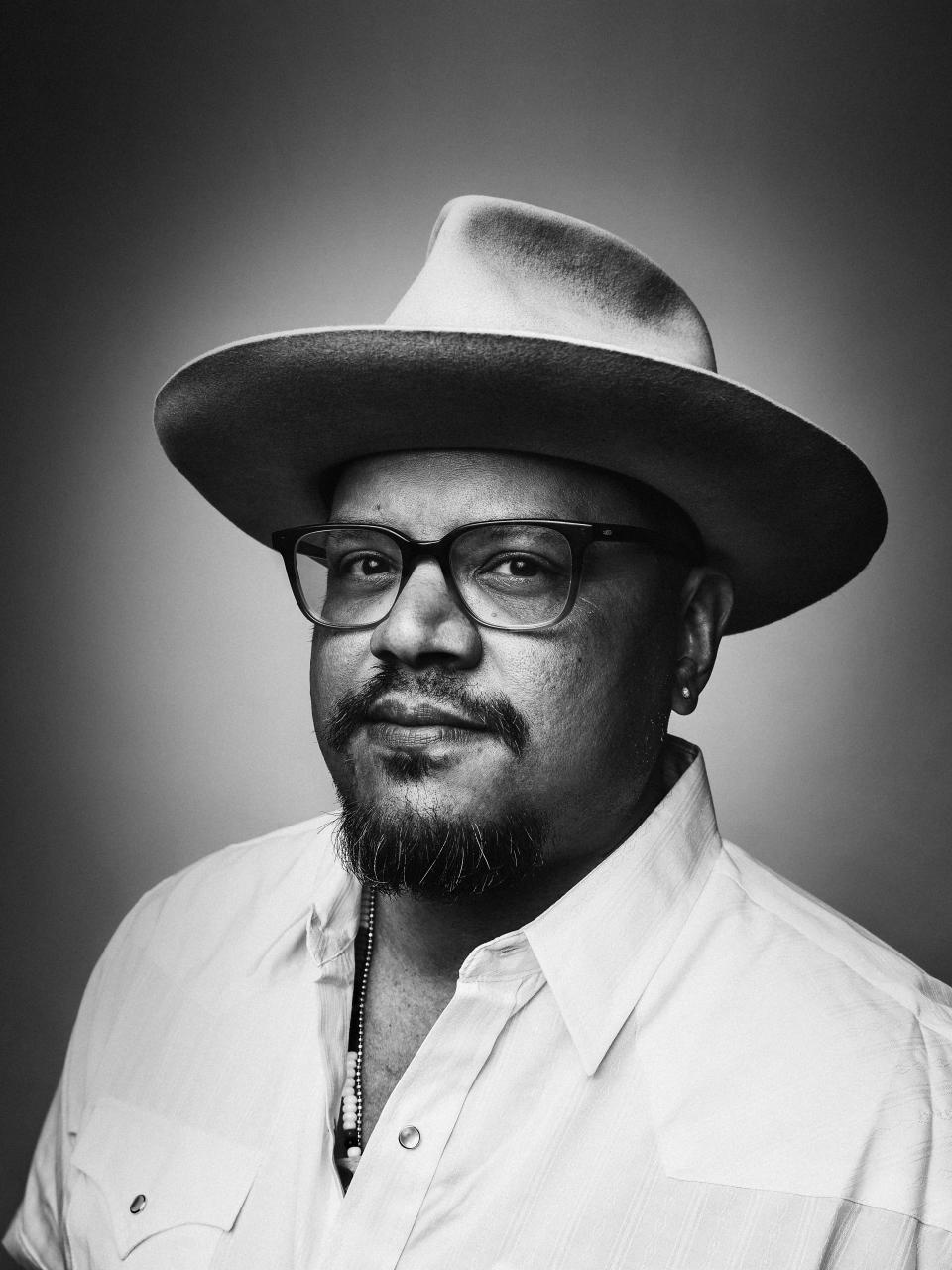
Josh Telles/Deadline
In many ways, this nonsensical moment between Bear and his spirit guide speaks to the heart of Reservation Dogs, a single-camera comedy that follows four Indigenous teenagers (played by Woon-A-Tai, Devery Jacobs, Paulina Alexis and Lane Factor) who live on a reservation in rural Oklahoma. One of the crowning achievements of the FX on Hulu series from filmmaker Sterlin Harjo and actor-writer Taika Waititi (JoJo Rabbit), aside from its all-Indigenous cast and crew, is the authentic and mostly comical way it depicts life in the native community. That means occasionally subverting preconceived notions about Native Americans, like whether spirit guides really do come for unexpected visits to impart wisdom and sound advice. (Spoiler alert: In Bear’s world, they absolutely don’t.) The result is a Peabody-winning series that’s not only been championed by critics who appreciate its poetic depiction of a world so often overlooked but enters Emmy season with the hope of making history in a category that traditionally honors shows with predominantly white casts.
“No one knows any truth or anything about native people,” explains Harjo, a Seminole/Muscogee Creek filmmaker from Holdenville, Oklahoma. “No one really knows what our lives are like. So, anything that I do is kind of breaking stereotypes.”
“That’s really an important thing for both of us, to get rid of the stereotypes that threaten to keep us stuck in time,” Waititi says. “We just want to show people that our cultures are alive and thriving. We are still here. We’re not just relegated to these images that you see in other movies and Westerns, where people assume Native Americans wear traditional clothes and ride horses and fight cowboys. That’s just one tiny part of a people’s history. It’s way richer than that.”
The road to Reservation Dogs first began in 2004. Harjo was a twentysomething working as a roofer and studying film at the University of Oklahoma when he got a call from the Sundance Institute about joining their program.
“I didn’t have money for a cell phone, and I had to borrow my dad’s phone,” Harjo recalls. “I was working with these two roofers, and I remember telling them that I had to go down and take this call. And I got a call from Michelle Satter and Lynn Auerbach and they were telling me that I got into the Sundance Labs. It blew me away. I crawled back on the roof and told these guys who didn’t know what the hell I was talking about. It was just a crazy, life-changing thing for sure. I wanted to be like Jim Jarmusch, making a living with independent films for the rest of my life. I never even thought of TV because that wasn’t really an option then.”
It was at Sundance where Harjo met Waititi through N. Bird Runningwater, a member of the Cheyenne and Mescalero Apache Tribes who guides the institute’s investment in Indigenous filmmakers. Harjo and Waititi hit it off immediately and bonded over their similar and very humorous stories from childhood, despite Waititi having grown up worlds away in New Zealand.
Since Harjo had already penned a script about his life as a native kid while Waititi had completed Boy (a film about an 11-year-old Maori kid in New Zealand that was released in 2010), the two eventually pooled their thoughts and created Reservation Dogs, about a group of teenage petty thieves who are trying to raise enough cash to move to California.
“I knew that it wouldn’t be a big stretch to try and capture the stuff that I’ve usually captured in New Zealand in my films, for a show about Native American kids,” Waititi remembers.
Since the multi-hyphenate had a first-look deal at FX (he was a writer on the network’s comedy What We Do in the Shadows from 2019-2021), Waititi had an open invitation to pitch his next big thing to the network.
“He and Sterlin talked about their stories growing up. They talked about being Indigenous people from different parts of the world,” recalls Kate Lambert, the senior vice president of original programming at FX. “It came pretty naturally. It was such a specific voice. When those walk through your door, you stand up, you listen, and you just try to support.”
That included respecting Harjo’s desire to employ only Indigenous people in front of and behind the camera. With the help of casting director Angelique Midthunder (Captain Fantastic), the team set out to cast their dogs in a nationwide search. That meant going to find their stars, not waiting for them to simply show up in Los Angeles.
“I had a TV show that was about to happen years ago and the executive producer, who was a well-known filmmaker, backed out at the last minute because he decided there weren’t enough native actors to cast and it killed the show,” Harjo says. “Yeah, if you’re lazy and if you are waiting for them to come to Hollywood and knock on your door. There’s not a lot of native roles out there so they’re not in Hollywood knocking on doors, trying to play dead Indians in a Western. You have to go to the community to find them.”
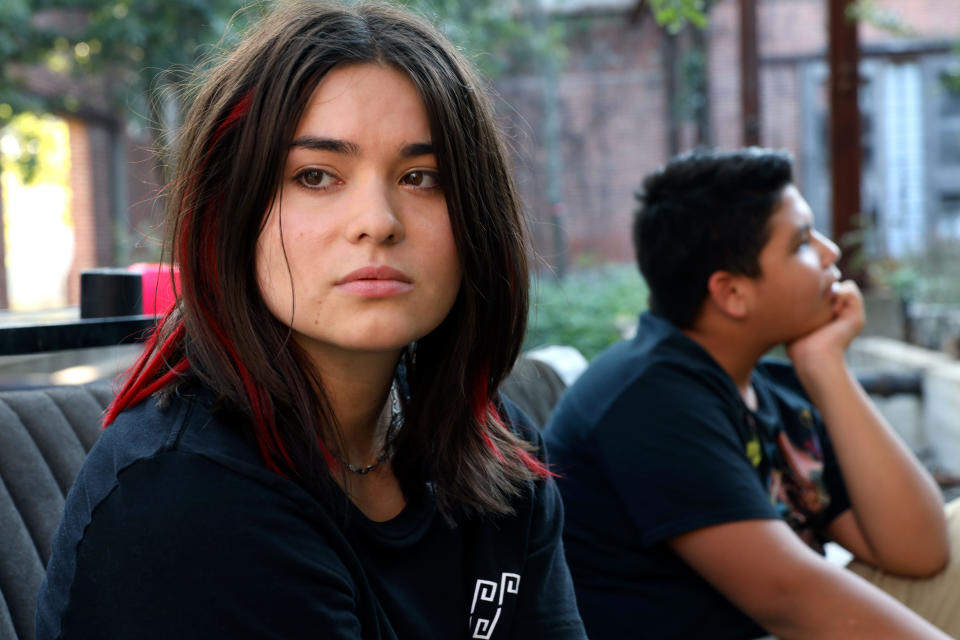
FX on Hulu
Two of Harjo’s young stars already had developed decent resumes: Jacobs, a member of the Mohawk Nation, is from Canada and has been working since 2007 in TV shows like Mohawk Girls (for Canada’s Omni TV) and Cold (for Verizon’s streaming platform). She plays Elora Danan, the unofficial leader of the group who lost her mom as a toddler and still mourns the loss of her pal Daniel (on which, more later). She’s also the bravest one of the foursome; Elora’s the one, for example, who was behind the wheel of a Flaming Flamers chip truck the kids steal in the comedy’s first episode. They go on to sell the chips to help fund their California trip.
“Elora Danan is really like a big sister to everybody,” says Jacobs. “Despite coming off as a bit moody and a bit crass sometimes, she is someone who cares so deeply that she needs to cover it up. But everything she does, comes from a place of love for her dogs.”
Woon-A-Tai, who is an Anishinaabe actor from Toronto, also racked up a few TV shows like Creeped Out for Netflix before hearing about the project through his agent. His character, Bear, is the son of a single mom (Sarah Podemski) whose deadbeat rapper dad left the family when he was young.
“I got what he [Harjo] was talking about, like California being this mysterious, magical land in people’s eyes. It’s the cool spot to be,” Woon-A-Tai says. “And if you talk about these little troublemakers, I get that too. I was a troublemaker, like almost everybody. We all had our little troublemaker phase.”
The remaining members of the rez foursome—Willie Jack and Cheese—are played by newcomers Paulina Alexis and Lane Factor. Alexis, a Nakota Sioux youth from central Alberta, is proud to share how Harjo and Waititi originally envisioned her role as a boy. But her audition and the ease at which she utters dialogue like “love you, bitch” quickly changed their minds. (Among Willie Jack’s funnier moments in the show: how she casually praises “white Jesus” on the way out of her house. “To brown and Black folks, just to see how white they make Jesus, it’s like at a certain point, it becomes ridiculous, and you have to say something,” says Harjo. “Willie Jack felt like the perfect person to say that first.”)
“I’ve always been used to being in front of a lot of people and making all of the adults laugh,” recalls Alexis, the comedy’s true breakout. “Like when I was a kid, I remember all my aunties and uncles being like, ‘Oh, you’re gonna be an actress someday.’ They love Willie Jack. They tell me it’s me, like I’m not even acting sometimes. It’s just me being me.”
Factor, in contrast, didn’t start out wanting to join the series. His sister was the actor in the family, not him. He wanted to be a paleontologist (and goes positively ga-ga over Godzilla). But after his mother bribed him with a trip to McDonald’s, he reluctantly joined his sister at the open casting call outside of his hometown of Yukon, Oklahoma. Though he originally read for Willie Jack, the producers gave him the part of the jovial Cheese, instead.
His sister, unfortunately, didn’t make the cut, which has made for uncomfortable moments around the family home.
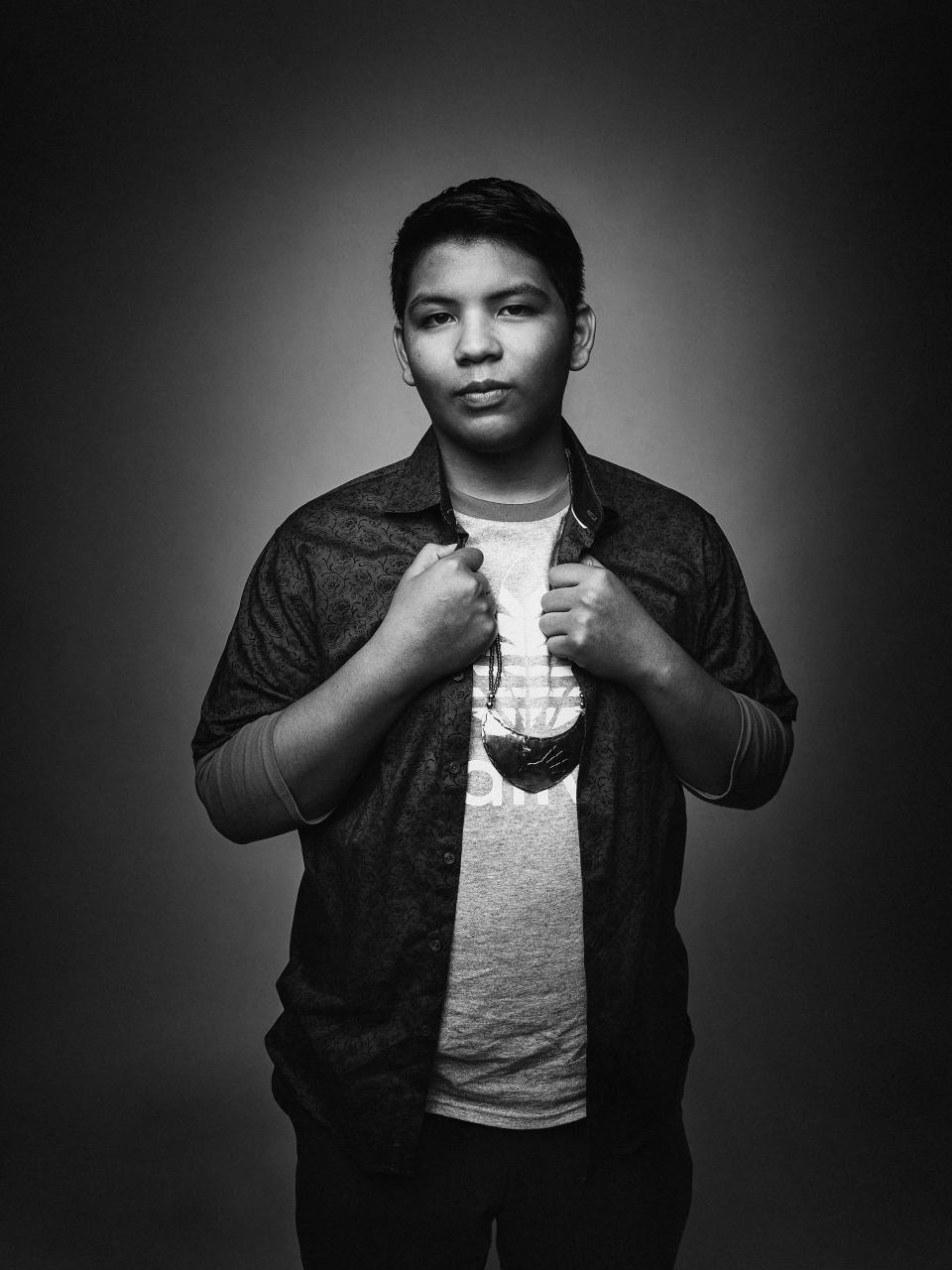
Josh Telles/Deadline
“She’s actually sitting across the room from me right now, giving the death glare,” says Factor, who describes his puckish character as “the kind of guy who just goes along with the plan and likes to hang out with his friends. He likes playing into their mischievous side, but he’s a very optimistic character. He’s also very, what’s the word? Naive. I guess he’s kind of naive.”
Filling out the cast are journeyman actors like Gary Farmer (Elora’s Uncle Brownie), a member of the Cayuga nation who is best known for his work in Resident Alien, Rutherford Falls and Longmire; and Zahn McClarnon, a Lakota actor who plays a tribal cop named Big. The rez dogs turn to Brownie for fighting lessons so they can defeat a rival crew but show begrudging respect to the omnipresent officer, who’s easily distracted with nutty phenomena like a “crop circle” of catfish that he found in a salvage yard.
“Big to these kids is more like an uncle,” McClarnon says. “They kind of tease him. He might be a little bit grumpy and treat the kids a little aggressively sometimes, but I think he wants to steer them in the right direction.”
Many other indigenous actors vied for the chance to join in the fun, but there were only so many parts to cast. Fortunately, Harjo refused to turn them away. “Sterling kind of explained to us that even if we weren’t selected for the core characters, he was building a whole world and there will likely be room for everybody,” Jacobs recalls. “He was like, ‘don’t get discouraged if you’re not landing one of the leading roles.’ He really stayed true to his word.”
One of those young actors was Dalton Cramer, who was cast in the recurring role of Daniel, the fifth member of the rez dogs who suggested they flee to California in the first place. It’s revealed in the first episode that Daniel died a year prior, but viewers don’t learn until the end of the season about how he lost his life. His death is particularly hard on Elora.
“She can’t envision living in that place without Daniel. Elora is running from her grief and not knowing how to deal with the loss of her best friend and crush,” Jacobs says. “I don’t think that she’s had a chance to really feel and see the beauty of her community. She’s just focused on getting out. California is this distant, far away fantasy.”
That’s as heavy as it gets in the first eight episodes, shot entirely in Oklahoma’s Muscogee Nation. Serious subjects still drive some of the action; Bear’s absentee dad Punkin Lusty (Sten Joddi), for example, becomes a huge disappointment for his son when he fails to show up for a scheduled visit. But the episode gets a comedic boost when Bear spends some of his California money to buy his dad a beaded microphone necklace that looks suspiciously like a penis with two balls.
In another episode, comedian Bill Burr (The King of Staten Island) plays Elora’s former high school coach who ends up sharing sweet stories about her late mom. Just when the action gets a little too meditative, the coach takes Elora on a wild car ride as he chases down his drug-addled daughter. Another good cameo (and great laugh) comes courtesy of Garrett Hedlund, who plays a sexy doctor that picks up Bear’s mom at a bar and brings her home to his bed. Rita thinks she has it made in the shade until she wakes up in his big house to find him sitting at the dining room table with his Confederate flag tattoo on full display.
“Native humor is always sort of encased in tragedy a little bit,” says Harjo. “It’s about survival, so drama and humor are always together. Some of the funniest times I’ve ever had, have been at funerals.”

Shane Brown/FX
Tribal myths have also made particularly good fodder for certain episodes. Don’t be shocked when you see a lady with deer hooves in episode five of Season 1; that’s actually based on tales that rocked Harjo’s world as a kid. “The way these mythological beings exist in the lives of native people is very matter-of-fact,” Harjo says. “Every tribe has their own version of the Deer Lady. It goes toward scaring young men about promiscuity, not to be a bad man, because there’s this being out there that will cut you up. Every culture has its Bigfoot, and we do, too. It’s referred to as Tall Man.”
Perhaps the best example of taking a stereotype and turning it on its head is Spirit, the chanting buffoon who’s better at delivering punchlines than serving up sage advice. “That’s a great instance of how they took that trope, that idea of what Western society thinks of what native people were and are, which no longer exists,” says Jacobs. “They flipped it and showed how there were idiots back then, too.”
“My uncle used to call me sh*t ass.”
That’s McClarnon talking about his big contribution to the first season of Reservation Dogs: an expletive that’s (mostly) used as a term of endearment between Big and the rez crew. “It stuck with me when I was a kid,” McClarnon says. “‘Sh*t ass’ comes out of love but can definitely be used as a derogatory statement.”
At first, it started out as a practical joke. “It ended up being a whole battle between Sterlin and other members of the camera crew and writers’ room,” Jacobs says. “They would take grip tape and write ‘sh*t ass’ on it and stick it on people’s backs without them knowing. It was like the ‘kick me’ sign. Suddenly there were sh*t ass signs everywhere. Sterlin managed to get it in like every episode of the show. Some people were like, ‘Oh, I thought it was a native thing.’ I was like, ‘No, that’s Sterlin and the rez dogs.’”
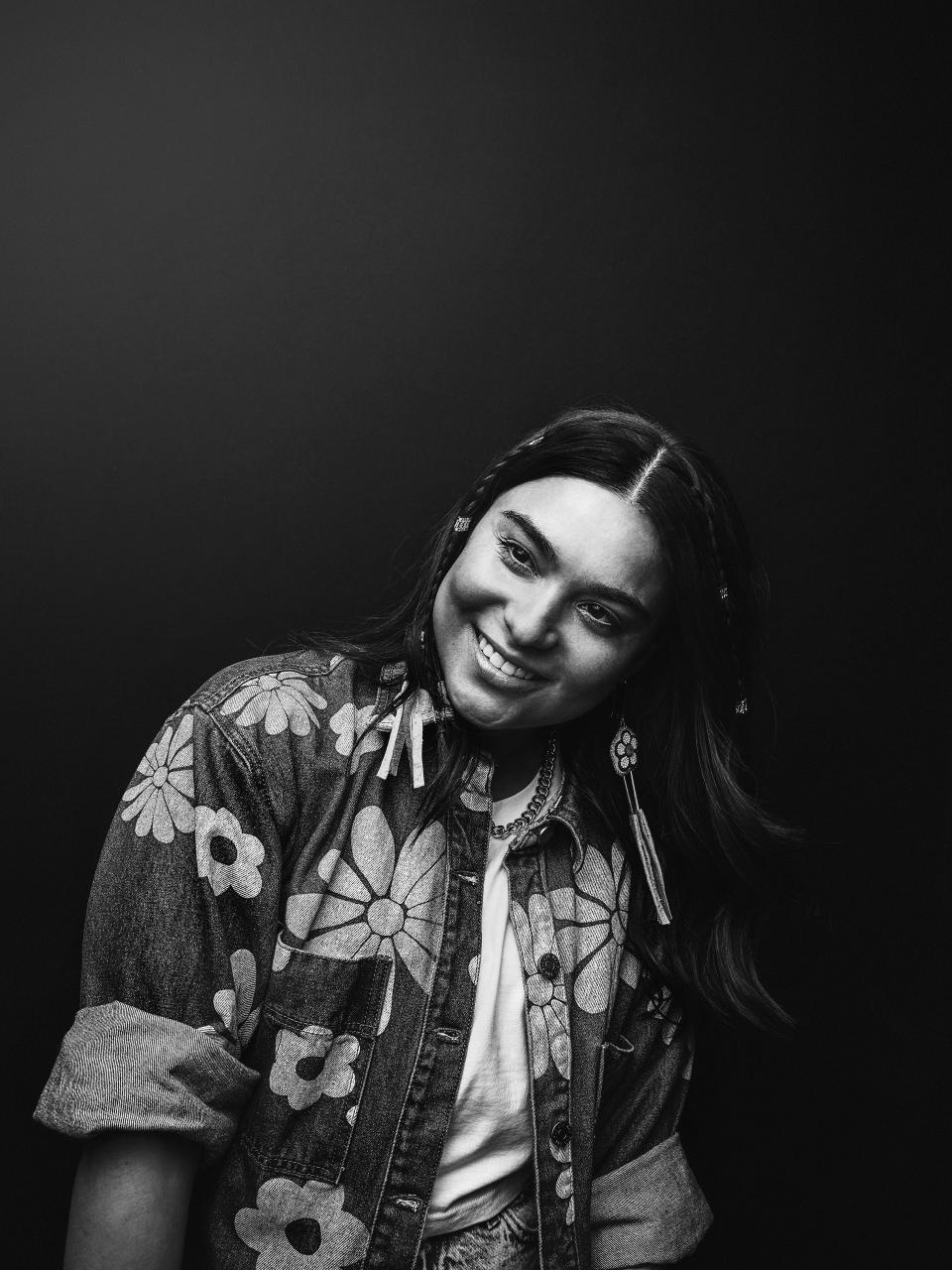
Josh Telles/Deadline
Despite the very grueling schedule (they typically complete one episode in four to five very packed days), calling each other ‘shit ass’ and consuming extra bags of Flaming Flamers are some of the more colorful ways the cast keeps itself entertained on set. But the mood has always been buoyant, thanks to the show’s incredible reception in Season 1. Besides the universal acclaim by critics, the series won two Independent Spirit Awards, one of which was for Best Ensemble Cast in a New Scripted Series. It also earned a second season order by FX and returns August 3.
The action picks up right where Season 1 left off, with Elora making the drive to California with Jackie (Elva Guerra), a member of the rival gang who was the only one willing to make the trip. Harjo is loath to provide any more details about the new season other than to say comedian/podcaster Marc Maron will make a cameo. “We just offered it to him, and he was into it. He liked the script.”
Finding special guest stars should become easier and easier, since the show’s fan base includes an A-lister or two. “I was at the premiere of Under the Banner of Heaven a couple of weeks ago, and at the afterparty, Ron Howard just bolted toward me, sat me down and told me how much he loved the show,” recalls McClarnon. “I grew up in the ’70s and the ’80s. Happy Days was one of my go-to shows. Having Ronnie Howard come up to me and say how much he enjoyed my character was pretty amazing. It’s an exciting time for natives in the media right now. We’re finally getting our own voice. It’s about time. The door is opening up a little bit more, and I’m glad I’m a part of it.”
An example of that widening door: Jacobs, who earned a 2021 Gotham Award Nomination for Outstanding Performance in a New Series, has been cast in Marvel Studios’ upcoming Disney+ series Echo. Written and executive produced by Etan Cohen and Emily Cohen, Echo centers on Maya Lopez (Alaqua Cox), a deaf Native American superhero who has a talent to imitate any opponent’s fighting style. Jacobs will play one of the leads named Julie, who’s described as a resilient and strong-willed young woman.
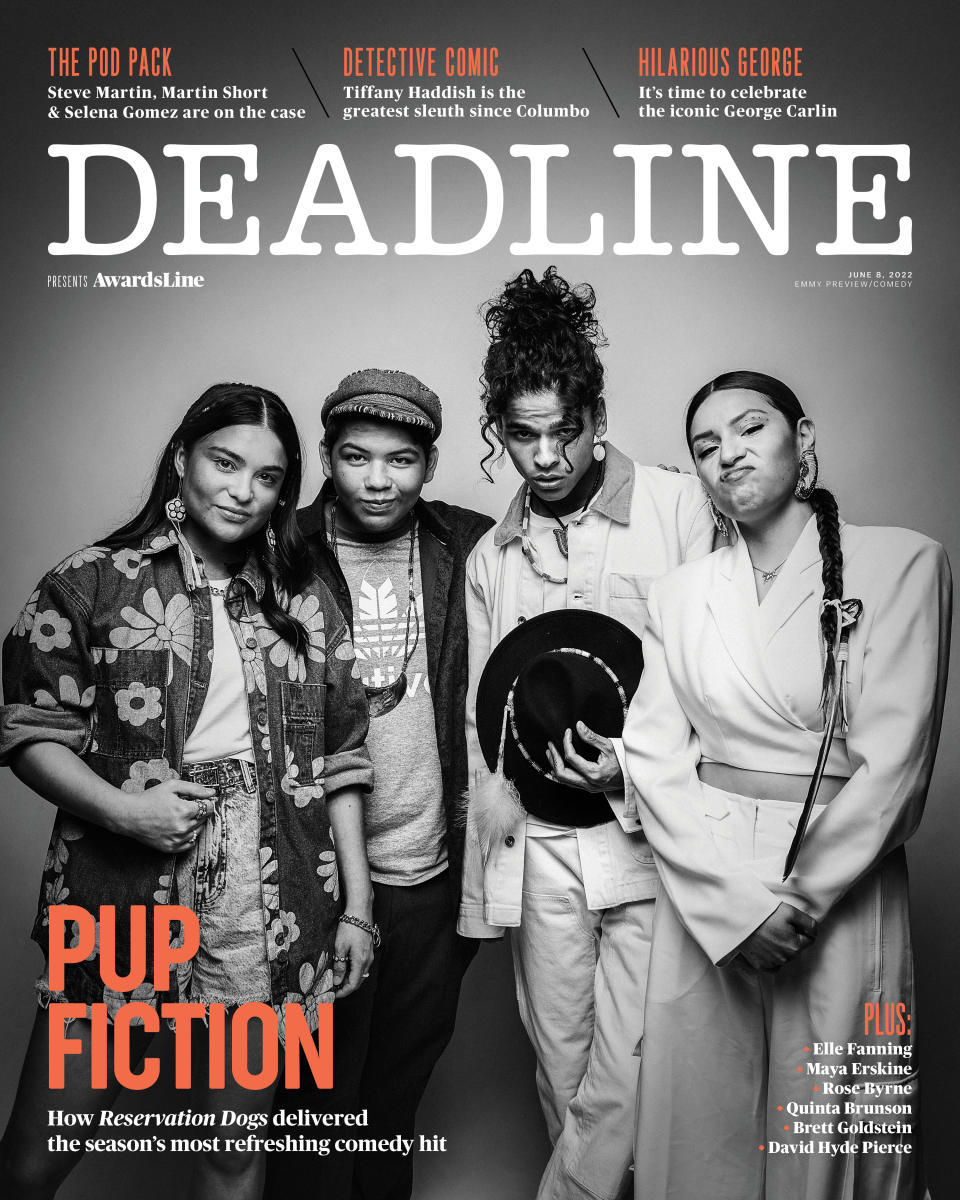
That won’t change things for Jacobs back on the rez, though. In addition to continuing her role as Elora, she took on new responsibilities in Season 2 as a writer. “I knew I really wanted to be in the writers’ room, so I was preparing myself for a big battle with Sterlin, by getting all my writing samples together. I was preparing to plead my case and pitch myself. I went to ask Sterlin and he offered to have me in the room. I was like, ‘Wait, I don’t have to battle for this?’ Which was so awesome.”
Factor, meanwhile, booked a role in Steven Spielberg’s upcoming The Fabelmans, a semi-autobiographical tale based on the director’s childhood growing up in post-war Arizona.
“I don’t have a main character role in that movie, I’m more of a side character,” Factor says. “But I did get to talk to Spielberg a few times. He filmed a scene personally with me in it, and that was unforgettable.”
Back in Oklahoma, though, he still puts his pants on one leg at a time so he’s not quite comfortable with all the attention that he and his co-stars have received. “Definitely whenever I get to talk to people, they’re all like, ‘Can we get a picture with you?’ They all seem nervous,” says Factor, who bought a gaming computer with his first season salary. “I’m like, ‘You know, you don’t have to be all formal with me. I’m just a regular kid.’”
Spoken like a true sh*t ass.
Best of Deadline
2022-23 Awards Season Calendar - Dates For The Oscars, Emmys, Tonys, Guilds, Festivals & More
Awards Season Red Carpet Photos: Grammys, Oscars, SAG Awards & More
Sign up for Deadline's Newsletter. For the latest news, follow us on Facebook, Twitter, and Instagram.

